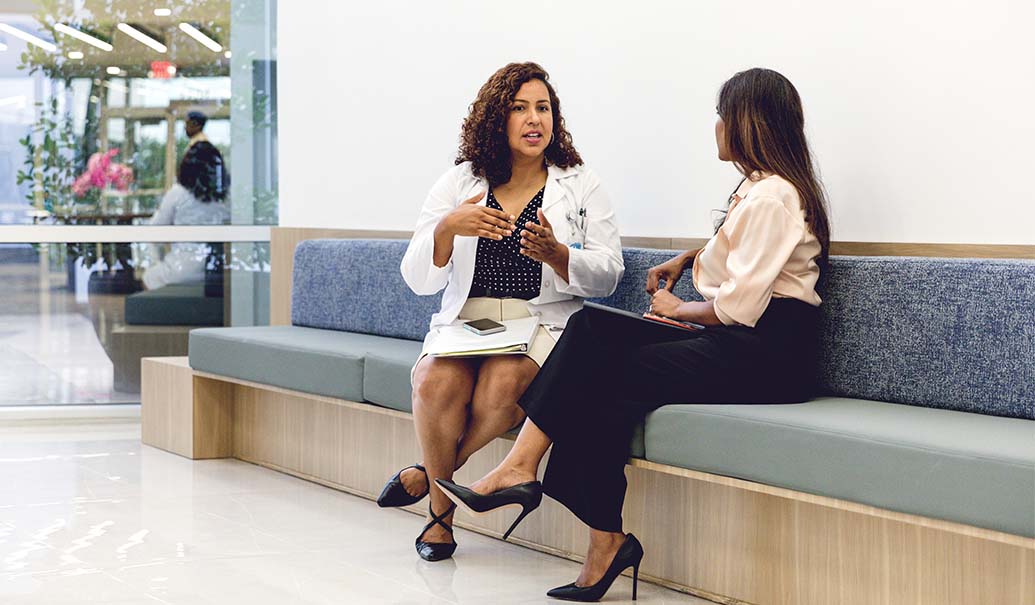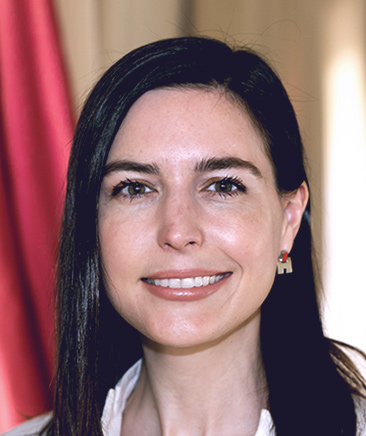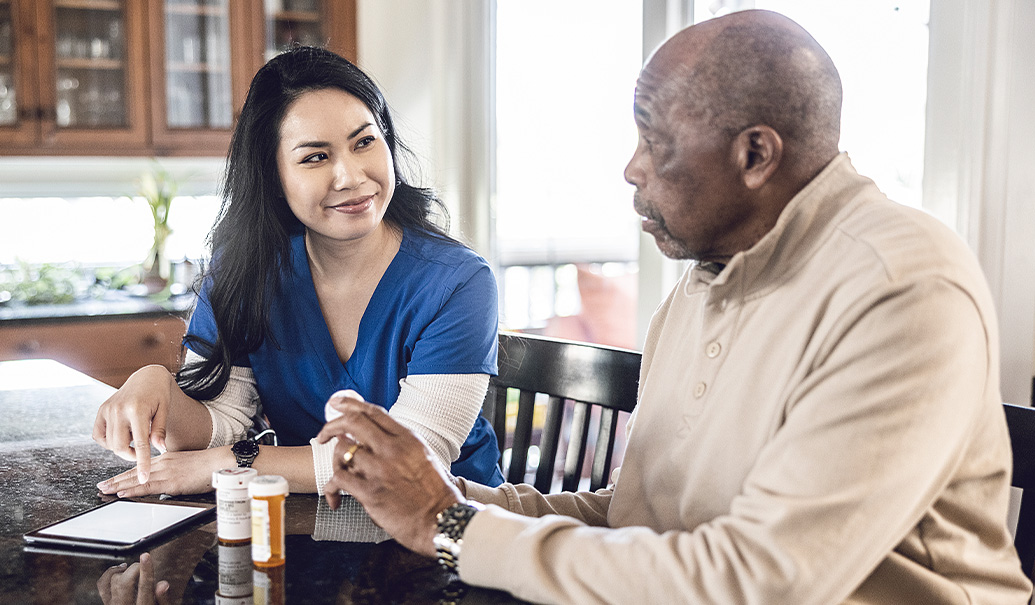Oncologists and consumers grasp the value of participating in a connected healthcare system, but ZS’s Future of Health research found that both parties are struggling to realize the benefits of connected care—and they have conflicting views about who’s responsible for building and sustaining it. This research, which evaluated perceptions of trust, connected care and health equity, surveyed 100 U.S. oncologists and more than 9,500 consumers in the U.S., U.K., Sweden, Germany, China and Japan. Of this sample, roughly 85% of surveyed individuals believe in a connected and convenient care model. These consumers also said they don’t feel “cared for,” “empowered” or “heard” and their sense of disengagement could have dire consequences in cancer care, where early diagnoses, precision medicine approaches and timely evidence-based treatment are crucial to positive outcomes.
ZS found that oncologists recognize the benefits of connected, coordinated care—including being able to consult with other members of a patient’s care team and having access to a patient’s full medical records. But, these same oncologists also reported feeling overwhelmed by data. Eighty-eight percent of oncologists agreed that the number of patients the average physician sees makes it harder to track patient health data. They also struggle to stay on top of a high volume of data, including data related to precision medicine, patient genetics, clinical trial results, new drug launches and data from lengthy patient records.
According to ZS’s research, while oncologists believe it’s hospitals’ responsibility to create a system in which stakeholders can share relevant data where and when it’s most needed, the public believes it’s up to physicians. The reasons for these misaligned expectations—between what consumers want and expect from the healthcare system and what oncologists need to feel supported in their work—are complicated. However, we believe that pharma companies working in the oncology space can play a critical connector role, helping oncologists and patients access the data and resources they need. These companies, which often have close relationships with physicians, health systems and patients, have the right tools to elevate and improve the oncology care continuum.
Even motivated and engaged patients struggle to feel connected in oncology
In ZS focus groups with cancer patients, we’ve found this patient population to be much more engaged and proactive than the consumers included in our Future of Health research. This is to be expected given early cancer detection has the best chance at a cure or long-term survival. After their diagnosis, these patients frequently use technology to track their symptoms and studies have found that doing so improves their outcomes. In addition, as many as half of these patients pursued opinions from more than one oncologist before initiating their first treatment. Thirty-five percent of those who got second opinions ultimately switched doctors. Understanding this shift in the patient journey is key to engaging these patients.
Of course, this degree of engagement and proactivity is usually only triggered once someone receives a life-changing diagnosis, which makes the Future of Health findings more worrisome. We found that one-quarter of U.S. adults avoid seeking care because it’s a hassle and 45% of U.S. patients skip regular health screenings. Further, 44% only see a doctor when they feel sick. Younger consumers are more likely to seek care where it’s more convenient for them, which perpetuates the fragmented care experience that complicates the cancer treatment journey.
As an October 2022 clinical correspondence in the journal Clinical Cancer Informatics notes, two full years after the start of the pandemic, diagnosis of new cancers continues to lag behind pre-pandemic levels. This is especially concerning for oncologists, who would expect an uptick in their diagnosis rate because of patients presenting in later stages due to missed screenings. This persistent decline in diagnoses, combined with the primary care shortage in the U.S., means patients are reaching oncologists at later stages in their disease, at a higher cost to the patient and the healthcare system.
Where pharma can help: To mitigate these challenges, new healthcare companies have stepped up to develop tests that can identify cancers at earlier stages. For example, Grail’s Galleri is a multicancer early detection (MCED) tool that can detect multiple tumor types with a single blood draw. Galleri can detect cancers at early stages and cancers that may be missed or are not a part of routine screening.
Beyond early detection, pharma can create a more connected ecosystem for patients by helping them access second opinions, clinical trials and complicated treatment regimens once they’re diagnosed. Our research found that only half of oncologists share records in a connected health system. ZS research with cancer patients revealed that while they’re active participants in their own treatment, they still experience a high degree of frustration when they can’t reach their oncologists over the phone or through their portals. Pharma companies may be able to help here. As patients become more comfortable with technology, pharma can develop tech-enabled patient support programs and solutions that offer more personalized support. Pharma-led apps and digital solutions that connect patients to their care teams as well as support groups and resources could help fill the trust gap.
Oncology drug manufacturers are also well positioned to help oncologists with workflow and connectivity issues. Coordination and information sharing during oncology-to-primary care physician handoffs remains a significant unmet need. Cancer patients are also highly likely to need referrals to specialists who may have practices outside of typical hospital or health system networks. For example, patients receiving immunotherapies may experience cardiac arrhythmias that require management by a cardiologist or thyroid dysfunction that requires management by an endocrinologist or internist. Manufacturers are familiar with how debilitating these complications can be and understand the mitigation strategies required to treat them. Consequently, they’re ideal partners for developing avenues of connectivity between oncologists and other members of a patient’s care team.
Pharma’s ‘data aggregator’ role in oncology
Oncologists overwhelmingly support the idea of connected health and believe it can help achieve several key priorities. When asked to rank the top five benefits of connected care, oncologists rated their top five priorities as:
- Making healthcare more affordable
- Coordinating care among the different healthcare providers working with patients
- Enhancing preventive care
- Spending more time with patients during visits
- Easing access to patients’ full medical records across the entire healthcare system
At the same time, 73% of oncologists told us that they often feel overwhelmed by the volume of data flowing their way, which they say is a barrier to connected health adoption. Even though the oncology market is viewed as the greatest area of opportunity for precision medicine, only 28% of oncologists are willing to share genetic data in a connected health setting.
Genetic data is among the most sensitive and protected data in healthcare, so oncologists are right to be cautious about how and with whom it’s shared. But this wariness could impede the translation of cancer research into clinical care and could make biomarker discovery cost ineffective. Precision medicine initiatives succeed when every data point about a patient is seen as a marker that helps form a holistic understanding of that patient’s health. Too little data sharing can also inhibit the application of AI in developing cutting-edge tools for preventive care and risk assessments.
Where pharma can help: Pharma can help oncologists by being “data aggregators” or bringing together disparate pieces of information at the point of care and prompting doctors on ways to use that information. Additionally, pharma can partner with electronic health record providers or central decision-making bodies within oncology sites of care to ensure that their decision support platforms are building awareness of new, exciting options as soon as they’re available to patients.
The increasing complexity of the treatment landscape has a huge impact on oncologists, especially community oncologists that treat a wide variety of cancer types. Choosing a treatment becomes more difficult when the number of products available for a certain line of therapy continues to increase and data doesn’t significantly differentiate new entrants. Digital solutions created by pharma companies could accelerate shared decision-making in these scenarios, help multiple players collaborate to manage patient side effects accurately and efficiently, improve time on treatment and ultimately improve the efficacy of prescribed products.
The future of health in oncology requires keeping up with the pace of change
Oncology is an extremely dynamic category, with more new launches, clinical trials and biomarker discoveries than any other field, and it’s moving faster than humans have the capacity to track on their own. A 2021 Precision Oncology News survey found that 30% of oncologists feel the field is moving too quickly and that it’s difficult to keep up with biomarker guidelines. That same survey found 10% of oncologists said they didn’t have clinical decision support tools to help them at the point of care.
Pharma companies certainly have the skills, tools, resources and knowledge to help oncologists and patients, but they will have to tread carefully. ZS’s Future of Health research found that while nearly all U.S. adults trust their doctors when it comes to sharing personal healthcare data, fewer (63%) trust pharmaceutical companies with it. This means pharma will need to be thoughtful and collaborative as they take on the role of connector in the oncology care continuum and build trust with the doctors and patients they’re serving. Forging truly connected, coordinated care in oncology, and in the healthcare system at large, requires collaboration with all the major players.
About our research
This research was conducted online by The Harris Poll on behalf of ZS from July-September 2022. It represents a balanced sample of more than 9,500 adults in six countries: the U.S., U.K., Germany, Sweden, China and Japan. Respondents included adults (individuals aged 18 and up) and 1,005 healthcare providers, including 101 oncologists. Healthcare provider participants were all licensed medical doctors with specialties in family, general or internal medicine, cardiology or oncology.
Add insights to your inbox
We’ll send you content you’ll want to read – and put to use.














